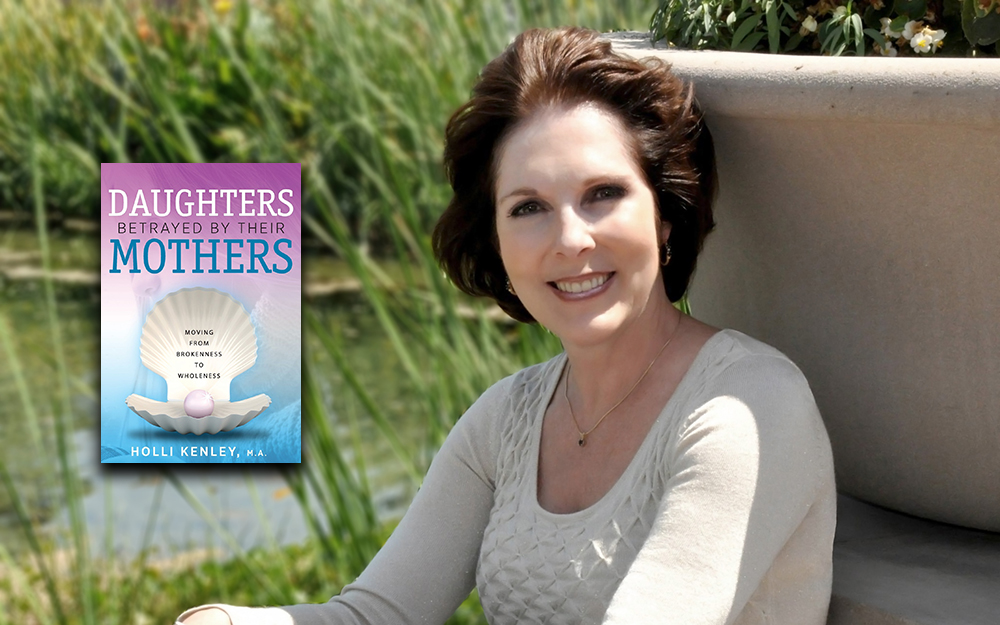
By Heidi Simmons
—–
Daughters Betrayed by Their Mothers
by Holli Kenley – Nonfiction
—–
We all have a mother. For some, a mother represents love and nurturing, while for others, it is a painful relationship. In Holli Kenley’s Daughters Betrayed by Their Mothers: Moving From Brokenness to Wellness (Loving Healing Press, 260 pages), women reveal how “bad” mothering shaped their reality.
Author Kenley explores the lives of seven women who had difficult and challenging relationships with their mothers. A licensed Marriage and Family Therapist, with a Master’s Degree in Psychology, Kenley diligently formed a safe way to structure a conversation about maternal betrayal, its lasting impact and the healing journey to recovery.
Kenley starts the book with her own betrayal experience using the method she devised through a series of questions. Referring to her book as “The Daughters Project,” Kenley realized that she first needed to explore the effects of her own mother’s betrayal on her life.
Sharing her journey from “Brokenness to Wellness,” Kenley wanted to honor herself, her voice and her truths. Talking about her mother, Kenley understood the narrative was her’s alone and not her mother’s.
As a child, “betrayal” was not how Kenley identified her relationship with her mother. It was a word that came later as she started the healing process. As a young girl, she only knew that her life, mother and family were seriously different.
Kenley reveals a household filled with criticism where she was never “good enough,” felt belittled and berated regularly for insignificant things. There was alcoholism and anger issues that Kenly found confusing. Her parents were strict, but their rules were unjust and unreasonable. There was never enough money to pay bills, but always enough to buy booze.
As a child, Kenley felt responsible for making her mother angry and there was nothing, no matter how hard she tried, that could make her mom happy. Her mother was mean and cruel. Kenley felt unloved which created a lasting betrayal with feelings of low self-worth, insecurity and abandonment.
Each of the women profiled in Kenley’s book provides insight into their personal lives, their mother’s world, and the impact of “betrayal” growing up and as adults coming to terms with what it means to have a mother who betrays rather than loves and nurtures.
The women, including Kenley, all experienced some form or combination of physical, mental or emotional abuse. Nearly all the women in Kenley’s “Daughters Project” sought professional treatment either specifically regarding their mothers or indirectly while in marital counseling.
If, dear reader, you have any problems with your mom, Daughters Betrayed by Their Mothers is an intense, often painful, but valuable read.
Throughout the seven personal narratives, there are revealing and troubling examples of how potent and damaging mothers can be to their children creating lasting injury and permanent scars.
The book is powerful as it turns to how the women discovered their strength, resilience and freedom. Most have found peace, balance and understanding regarding their mothers. But, the women in the book also confess that their journey to wellness is a continuing process.
I was moved by how many of the women who experienced bad mothering and betrayal growing up, thought they were alone and believed they were the problem – a bad person, ugly, stupid, worthless, etc.
I was impressed by the level of success and drive many of the women had and have. Amazingly, these women were able to embrace their potential, learn to trust and depend on themselves, and love fully. Some admit bad moms and necessity, made them self-reliant, independent or brave. Several women were inspired to help others by becoming therapists themselves.
I was saddened thinking about the generation of “bad mothers” who seemed to be women who lived unfulfilled personal lives.
Many of the “mothers” were young, entering into roles and relationships for which they were clearly unprepared. None seemed to have meaningful careers, mental health support, or loving partners. Unhappiness was a common denominator.
This is Kenly’s seventh book pertaining to recovery, mental health and parenting.
Reading Daughters Betrayed by Their Mothers is like sitting in on counseling sessions. As Kenley compassionately guides the participants through the tough and emotional questions, she thoughtfully interjects giving us a sense of the authenticity, relevance and depth of the betrayal.
Finally, Kenley presents an analysis of the entire “Daughters Project.” Besides the professional challenge, she comments that the process provided her with a deep personal source of growth. Kenley compiles the narratives, giving the reader perspective, insight, hope and healing.
Part of what makes this book so compelling is that Kenley, with professionalism, kindness, generosity and humility, participates in the project as a daughter betrayed, which generates a sisterhood of safety, understanding and support. The book contains the interview questions, along with an index and bibliography.
Kenley lovingly compares the betrayed daughters’ healing process to the opening of an oyster revealing a priceless pearl produced by an injured life.








































